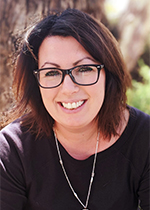Dr Michelle Fitts
 Michelle is a Senior Research Fellow at the Institute for Culture and Society, Western Sydney University. Based in Alice Springs, she has worked for over a decade with Aboriginal and Torres Strait Islander communities in Queensland and Northern Territory. Her research experience is largely on multi-site projects examining alcohol, traumatic brain injury, disability and drink driving. Michelle holds an Australian Research Council DECRA Fellowship (2021-2024), focused on understanding the daily lives of Aboriginal and Torres Strait Islander women who have sustained a traumatic brain injury through family violence. This program of work with women living with traumatic brain injury, their families and the services who support them will seek to bridge the gap between research and practice and help inform the service delivery of disability, legal, health and family violence agencies.
Michelle is a Senior Research Fellow at the Institute for Culture and Society, Western Sydney University. Based in Alice Springs, she has worked for over a decade with Aboriginal and Torres Strait Islander communities in Queensland and Northern Territory. Her research experience is largely on multi-site projects examining alcohol, traumatic brain injury, disability and drink driving. Michelle holds an Australian Research Council DECRA Fellowship (2021-2024), focused on understanding the daily lives of Aboriginal and Torres Strait Islander women who have sustained a traumatic brain injury through family violence. This program of work with women living with traumatic brain injury, their families and the services who support them will seek to bridge the gap between research and practice and help inform the service delivery of disability, legal, health and family violence agencies.
Prior to Western Sydney University, Michelle worked in the Wellbeing and Preventable Chronic Disease Division at Menzies School of Health Research and at the Australian Institute of Tropical Health and Medicine, James Cook University. Michelle is an Adjunct Research Fellow at James Cook University. Her community and service provider partnerships have led to the creation of important outcomes including traumatic brain injury resources and a community drink driving program.
Qualifications
- PhD, 2015, Queensland University of Technology
- Postgraduate Diploma in Criminology, 2008, The University of Melbourne
- Graduate Diploma in Criminology, 2007, The University of Melbourne
- Bachelor of Science (Psychology), 2005, Deakin University
Research Focus
- Alcohol
- Traumatic brain injury
- Disability
- Remote health
- Road safety
- Drink driving
Selected Awards and Recognition
- 2015 - Peter Vulcan Award for Best Research Paper
- 2013 - RACQ: Award: Drink Driving Rehabilitation and Artwork Camps
- 2009 - Australian Institute of Criminology - CARRS-Q’s Under the Limit (UTL) drink driving education and rehabilitation program
Selected Publications
Wills, E, & Fitts, M.S. Listening to the voices of Aboriginal and Torres Strait Islander women in regional and remote Australia about traumatic brain injury from family violence: A qualitative study. Health Expectations. (under review)
Fitts, M.S., & Soldatic, K. Temporalities of emergency: The experiences of Aboriginal and Torres Strait Islander women with traumatic brain injury from violence waiting for healthcare and service supports. Health Sociology Review. (in press).
Fitts, M.S., Johnson, Y. & Soldatic, K. (2024). The Emergency Department Response to Indigenous Women Experiencing Traumatic Brain Injury from Family Violence: Insights from Interviews with Hospital Staff in Regional Australia. Journal of Family Violence. https://doi.org/10.1007/s10896-023-00678-5
Fitts, M.S., Cullen, J., & Barney, J. (2023). Barriers Preventing Indigenous Women with Violence-Related Head Injuries from Accessing Services in Australia. Australian Social Work. 76(3), 406–419, DOI: 10.1080/0312407X.2023.2210115
Fitts, M.S., Cullen, J., Kingston, G., Johnson, Y., Wills, E., & Soldatic, K. (2023). Using research feedback loops to implement a disability case study with Aboriginal and Torres Strait Islander communities and service providers in regional and remote Australia, Health Sociology Review, 32:1, 94-109, DOI: 10.1080/14461242.2023.2173018
Fitts, M.S., Cullen, J., Kingston, G., Johnson, Y., Wills, E., & Soldatic, K. (2023). Understanding the Lives of Aboriginal and Torres Strait Islander Women with Traumatic Brain Injury through Family Violence in Australia: A Qualitative Study Protocol. International Journal of Environmental Research and Public Health, 20(2):1607. https://doi.org/10.3390/ijerph20021607
Fitts, M.S., Cullen, J., Kingston, G., Wills, E., & Soldatic, K. (2022). “I Don’t Think It’s on Anyone’s Radar”: The Workforce and System Barriers to Healthcare for Indigenous Women Following a Traumatic Brain Injury Acquired through Violence in Remote Australia. International Journal of Environmental Research and Public Health,19, 14744. https://doi.org/10.3390/ijerph192214744
Fitts, M.S., Bird, K., Gilroy, J., Fleming, J., Clough, A., Esterman, A., Maruff P., Fatima, Y. & Bohanna, I. (2019). The Transition Support Needs of Indigenous Australians Following Traumatic Brain Injury. Brain Impairment, 20 (2), 137-159.
Bohanna, I., Fitts, M.S., Bird, K., Fleming, J., Gilroy, J., Clough, A., Esterman, A., Maruff P. & Potter, M. (2019). The Potential of a Narrative and Creative Arts Approach to Enhance Transition Outcomes for Indigenous Australians Following Traumatic Brain Injury. Brain Impairment, 20(2), 1-11.
Esterman, A., Thompson, F., Fitts, M., Gilroy, J., Fleming, J., Maruff, P., Clough, A. & Bohanna, I. (2018). Incidence of emergency department presentations for traumatic brain injury in indigenous and non-indigenous residents aged 15–64 over the 9-year period 2007–2015 in north Queensland, Australia . Injury Epidemiology, 5(1), 1-7.




